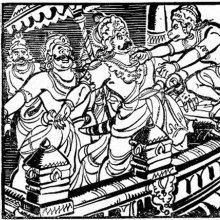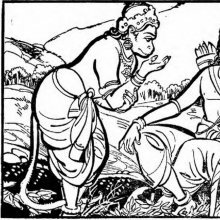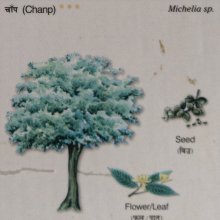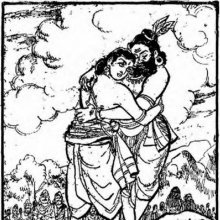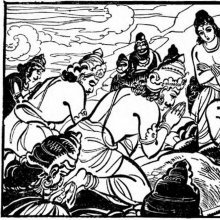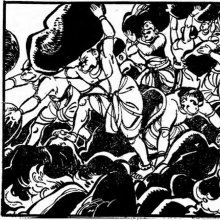Camp, Caṃp: 7 definitions
Introduction:
Camp means something in Hinduism, Sanskrit. If you want to know the exact meaning, history, etymology or English translation of this term then check out the descriptions on this page. Add your comment or reference to a book if you want to contribute to this summary article.
Alternative spellings of this word include Champ.
Images (photo gallery)
(+1 more images available)
In Hinduism
Kavya (poetry)
Source: OpenEdition books: Vividhatīrthakalpaḥ (Kāvya)Caṃp (चंप्) in Prakrit means “to press”, as is mentioned in the Vividhatīrthakalpa by Jinaprabhasūri (13th century A.D.): an ancient text devoted to various Jaina holy places (tīrthas).—(Jacobi 1886 p. 108).

Kavya (काव्य, kavya) refers to Sanskrit poetry, a popular ancient Indian tradition of literature. There have been many Sanskrit poets over the ages, hailing from ancient India and beyond. This topic includes mahakavya, or ‘epic poetry’ and natya, or ‘dramatic poetry’.
Languages of India and abroad
Sanskrit dictionary
Source: DDSA: The practical Sanskrit-English dictionaryCamp (चम्प्).—1 U. (campayati-te) To go, move.
Source: Cologne Digital Sanskrit Dictionaries: Shabda-Sagara Sanskrit-English DictionaryCamp (चम्प्).—[campa] r. 1st cl. (campati) To go or move.
Source: Cologne Digital Sanskrit Dictionaries: Benfey Sanskrit-English DictionaryCamp (चम्प्).—i. 10, [Parasmaipada.] To go, v. r.
Source: Cologne Digital Sanskrit Dictionaries: Monier-Williams Sanskrit-English DictionaryCamp (चम्प्):—(cf. √kamp, capala) [class] 10. payati [varia lectio] for √champ, [Dhātupāṭha xxxii, 76.]
[Sanskrit to German]
Sanskrit, also spelled संस्कृतम् (saṃskṛtam), is an ancient language of India commonly seen as the grandmother of the Indo-European language family (even English!). Closely allied with Prakrit and Pali, Sanskrit is more exhaustive in both grammar and terms and has the most extensive collection of literature in the world, greatly surpassing its sister-languages Greek and Latin.
See also (Relevant definitions)
Starts with (+257): Campa, Campaca, Campacampa, Campacampati, Campachu, Campacivan, Campadhipa, Campaga, Campai, Campaikkonkani, Campaka, Campakacaturdashi, Campakacchaye, Campakadesha, Campakagandha, Campakah, Campakakusuma, Campakalata, Campakalu, Campakam.
Ends with: Bhaycamp.
Full-text (+388): Shivira, Skandhavara, Shibira, Balasthiti, Vahininivesha, Senacara, Khema, Shainya, Senavasa, Avaskanda, Paridhistha, Jaya-skandhavara, Camagadada, Kataka, Bhumikampa, Nivesha, Kampu, Khandhavara, Paleyamgey, Khalashi.
Relevant text
Search found 133 books and stories containing Camp, Caṃp; (plurals include: Camps, Caṃps). You can also click to the full overview containing English textual excerpts. Below are direct links for the most relevant articles:
Kautilya Arthashastra (by R. Shamasastry)
Chapter 4 - Battlefields and the Work of Infantry, Cavalry, Chariots and Elephants < [Book 10 - Relating to War]
Chapter 2 - March of the Camp < [Book 10 - Relating to War]
Chapter 1 - Encampment < [Book 10 - Relating to War]
Nitiprakasika (Critical Analysis) (by S. Anusha)
War Planning < [Chapter 4]
Training for the four-fold army (VI. 59-67) < [Chapter 4]
The Jataka tales [English], Volume 1-6 (by Robert Chalmers)
Jataka 24: Ājañña-jātaka < [Book I - Ekanipāta]
Jataka 23: Bhojājānīya-jātaka < [Book I - Ekanipāta]
Jataka 226: Kosiya-jātaka < [Book II - Dukanipāta]
Krishnaji: An Impressionistic Sketch < [May-June 1933]
A Glimpse of Stalin's Russia < [October - December 1977]
Savi < [April & May 1948]
Warfare and Military System in Vedic Literature (by Rinki Deka)
The Deployment of Battle Array and Camps < [Chapter 4 - Principles and Ethics related to the Warfare]
Military Espionage < [Chapter 2 - Military System as Revealed in the Vedic Texts]
Mahabharata (English) (by Kisari Mohan Ganguli)
Related products
